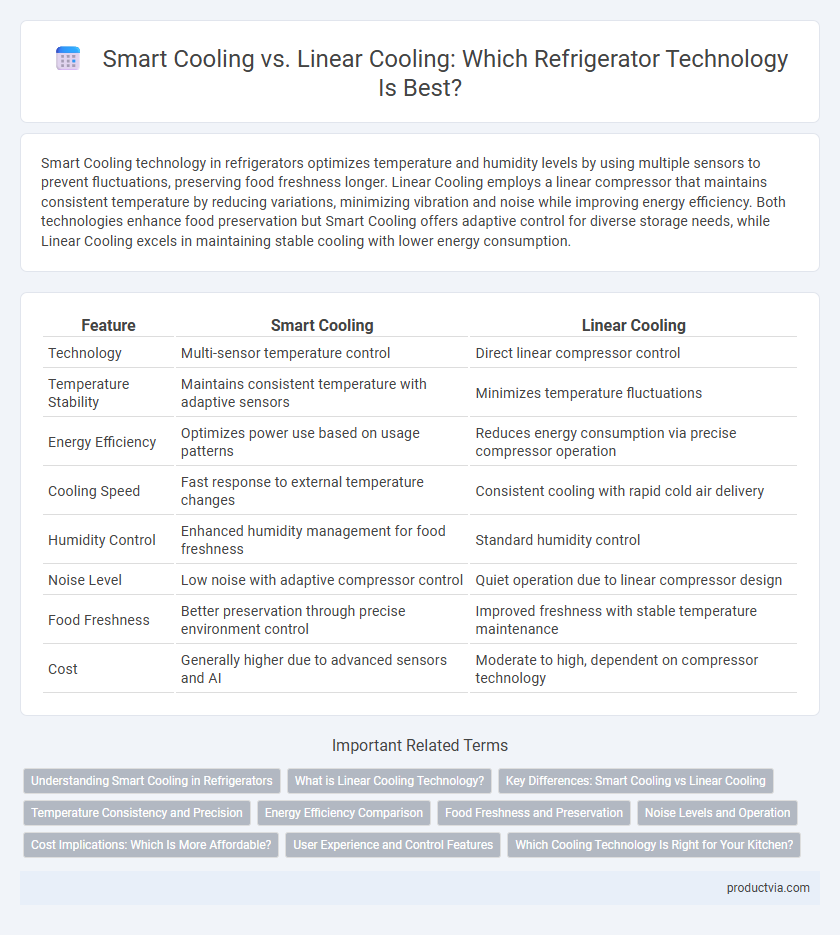Smart Cooling technology in refrigerators optimizes temperature and humidity levels by using multiple sensors to prevent fluctuations, preserving food freshness longer. Linear Cooling employs a linear compressor that maintains consistent temperature by reducing variations, minimizing vibration and noise while improving energy efficiency. Both technologies enhance food preservation but Smart Cooling offers adaptive control for diverse storage needs, while Linear Cooling excels in maintaining stable cooling with lower energy consumption.
Table of Comparison
| Feature | Smart Cooling | Linear Cooling |
|---|---|---|
| Technology | Multi-sensor temperature control | Direct linear compressor control |
| Temperature Stability | Maintains consistent temperature with adaptive sensors | Minimizes temperature fluctuations |
| Energy Efficiency | Optimizes power use based on usage patterns | Reduces energy consumption via precise compressor operation |
| Cooling Speed | Fast response to external temperature changes | Consistent cooling with rapid cold air delivery |
| Humidity Control | Enhanced humidity management for food freshness | Standard humidity control |
| Noise Level | Low noise with adaptive compressor control | Quiet operation due to linear compressor design |
| Food Freshness | Better preservation through precise environment control | Improved freshness with stable temperature maintenance |
| Cost | Generally higher due to advanced sensors and AI | Moderate to high, dependent on compressor technology |
Understanding Smart Cooling in Refrigerators
Smart Cooling technology in refrigerators utilizes multiple sensors to monitor and control temperature and humidity levels precisely, ensuring consistent cooling throughout the compartments. This adaptive system optimizes energy efficiency while maintaining freshness by adjusting cooling based on usage patterns and external conditions. Compared to Linear Cooling, which provides steady temperature control through fixed compressor operation, Smart Cooling offers more dynamic and responsive climate management.
What is Linear Cooling Technology?
Linear Cooling technology in refrigerators maintains a consistent temperature by adjusting the compressor speed precisely, minimizing fluctuations to keep food fresher longer. This system uses a linear compressor that responds quickly to changes in temperature and humidity, reducing spoilage and preserving nutritional value. Compared to Smart Cooling, which uses multiple sensors to optimize air circulation, Linear Cooling emphasizes stable temperature control for enhanced freshness.
Key Differences: Smart Cooling vs Linear Cooling
Smart Cooling technology uses multiple sensors to monitor and adjust the temperature and humidity in different fridge zones, ensuring optimal freshness and energy efficiency. Linear Cooling employs a single compressor that maintains consistent temperature by reducing fluctuations, which extends food freshness and minimizes power consumption. The key difference lies in Smart Cooling's adaptive multi-zone control versus Linear Cooling's steady compressor-driven temperature stability.
Temperature Consistency and Precision
Smart Cooling technology utilizes multiple sensors to monitor and adjust temperature throughout the refrigerator, ensuring uniform cooling and minimizing fluctuations. Linear Cooling employs a linear compressor that delivers precise temperature control by responding quickly to changes in internal conditions, maintaining consistent freshness for stored food. Both technologies significantly enhance temperature consistency and precision compared to conventional systems.
Energy Efficiency Comparison
Smart Cooling technology in refrigerators optimizes temperature and humidity control through sensors and adaptive algorithms, significantly reducing energy consumption by minimizing cold air loss during door openings. Linear Cooling maintains a consistent temperature by regulating the compressor frequency, improving energy efficiency with fewer temperature fluctuations and less compressor activity. Studies show Smart Cooling can reduce energy usage by up to 15% more than Linear Cooling, making it a more effective solution for energy-efficient refrigeration.
Food Freshness and Preservation
Smart Cooling technology in refrigerators uses sensors to monitor temperature and humidity, optimizing cooling to maintain consistent freshness and reduce food spoilage. Linear Cooling systems employ a direct cooling mechanism that stabilizes temperature fluctuations more effectively, preserving food texture and nutrients for longer periods. Both technologies enhance food preservation by minimizing temperature variations, but Linear Cooling often provides superior temperature stability for extended freshness.
Noise Levels and Operation
Smart Cooling technology in refrigerators uses sensors and adaptive algorithms to regulate temperature and humidity, resulting in quieter operation due to optimized compressor activity. Linear Cooling employs a linear compressor that reduces fluctuations in temperature, minimizing noise by maintaining a consistent cooling cycle without frequent starts and stops. Both technologies enhance energy efficiency, but Linear Cooling typically offers lower noise levels during operation, making it ideal for noise-sensitive environments.
Cost Implications: Which Is More Affordable?
Smart Cooling technology offers precise temperature management through multiple sensors and variable compressors, generally resulting in higher upfront costs but better energy efficiency and food preservation. Linear Cooling maintains a consistent temperature using a linear compressor, often making it more affordable with lower maintenance expenses over time. Consumers seeking a balance between initial investment and long-term savings may find Linear Cooling more budget-friendly, while Smart Cooling appeals to those prioritizing advanced performance despite the higher price.
User Experience and Control Features
Smart Cooling technology in refrigerators uses advanced sensors and algorithms to monitor and adjust temperature and humidity levels dynamically, enhancing food freshness and energy efficiency while providing users precise control via smartphone apps. Linear Cooling systems maintain temperature stability by using a direct cooling mechanism, reducing fluctuations and preserving food quality with minimal energy consumption, often featuring intuitive manual controls for straightforward user management. Both technologies offer improved user experience, with Smart Cooling excelling in adaptive control and connectivity, whereas Linear Cooling emphasizes consistent preservation through simplified, reliable temperature regulation.
Which Cooling Technology Is Right for Your Kitchen?
Smart Cooling technology uses sensors to monitor and adjust temperature and humidity levels for specific compartments, ensuring optimal freshness and energy efficiency. Linear Cooling maintains a more consistent temperature by reducing fluctuations, which minimizes food spoilage and extends the shelf life of stored items. Choosing between Smart Cooling and Linear Cooling depends on your kitchen's storage needs, with Smart Cooling ideal for diverse food types and Linear Cooling best for consistent temperature preservation.
Smart Cooling vs Linear Cooling for Refrigerator Technology Infographic

 productvia.com
productvia.com